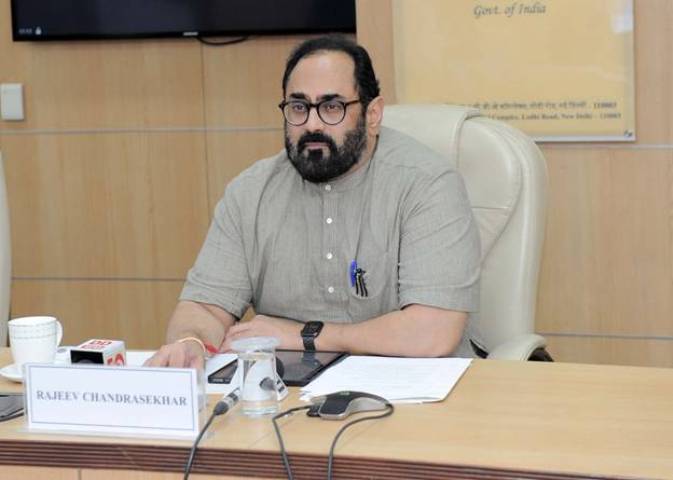Algorithms of social media platforms should not violate fundamental rights: Rajeev Chandrasekhar

- Country:
- India
No algorithm of any social media platform should violate the fundamental rights of Indians, and the laws and jurisprudence would need to evolve continuously to keep pace with the changing nature of the internet, Union minister Rajeev Chandrasekhar has said.
The remarks by the Minister of State for IT come amid allegations of Facebook's system and algorithms fuelling hate speech and fake news.
Recently, revelations by whistle-blower Frances Haugen have led to global concerns that Facebook allegedly put profit before the public good, and did not do enough to shed its 'growth at all costs culture that propelled its rise to capture 2.91 billion monthly active users globally, including over 400 million in India.
When asked about what action the Indian government would look at in the backdrop of the allegations made by the whistleblower, Chandrasekhar said some algorithms are replacing human intervention and are also prone to failure.
''... we understand that there are algorithms that are replacing human intervention and those algorithms are also prone to failure, which may be just unconscious failure or it could be deliberate bias and that there is a need for algorithms to be designed by this platform that is not infringing the rights of our Indian citizens to Article 14 (non-discrimination), Article 19 (freedom of speech), and Article 21 (right to privacy),'' he told PTI.
These are fundamental rights of Indian citizens and ''no algorithm of any platform should be able to violate that, that we are aware of'', Chandrasekhar said.
Noting that the government is very much aware of the issues of algorithmic bias, Chandrasekhar said he was personally aware of it and had also spoken about the same in 2019 in Parliament.
There is a ''basket of user harm issues'' arising every day in online space, the minister said, adding that ''there is a need for our laws and jurisprudence to continuously evolve and keep up with the changing nature of the internet and all of the good and the bad''.
''Now, that is a process that our legal rules and laws, as they evolve, will start addressing... as I said, there is a basket of user harm issues that are arising every day... IT Act is from 2008 and 2000. The rules are more recent...,'' he observed.
According to him, the government and the IT Ministry understand the constantly evolving nature of cyberspace and the internet, and will continuously engage with industry and users on the issues.
''We will constantly be trying to evolve a framework where consumers are protected, they find that the internet is safe and trusted for them and that the intermediaries are accountable... this, we will continue to do, and whether it is on algorithms or any other issue, we will continue to make our efforts in doing that,'' Chandrasekhar said.
Haugen, an employee of the Facebook integrity team until May 2021, leaked tens of thousands of internal documents, including many from employee discussion sites, company presentations, and research papers, that have unveiled the inner workings of Facebook.
She has suggested that Facebook made changes to its ''dangerous'' algorithms that contributed to divisiveness in society, and realized these tweaks kept people returning to the platform.
She has also filed complaints against the company with the US securities regulator.
Following the revelations, the ministry reportedly wrote to Facebook asking for information around the algorithms and processes used by the platform and sought details of steps taken to safeguard users.
Facebook has recently rebranded itself as Meta.
As per data cited by the Indian government earlier this year, there are 53 crore WhatsApp users, 41 crores Facebook subscribers, and 21 crore Instagram account holders in the country.
Earlier this year, India enforced new IT intermediary rules aimed to bring greater accountability for big tech companies, including Twitter and Facebook.
The rules require social media platforms to remove any content flagged by authorities within 36 hours and set up a robust complaint redressal mechanism with an officer being based in the country. Social media companies are required to take down posts depicting nudity or morphed photos within 24 hours of receiving a complaint.
Significant social media companies -- those with over 50 lakh users -- also have to publish a monthly compliance report disclosing details of complaints received and action taken as also details of contents removed proactively.
According to Chandrasekhar, the IT Ministry is also planning a massive outreach next year in the form of a dialogue with the public, consumer forums, academia, industry, and others on fast-evolving online space and what more needs to be done to ensure that the internet is open, safe and trusted.
(This story has not been edited by Devdiscourse staff and is auto-generated from a syndicated feed.)
ALSO READ
Modi govt brought 25 crore Indians out of poverty: PM Modi
Mumbai Indians opt to bowl against Royal Challengers Bengaluru
Study reveals that a majority of Indians support a 'strong' leader and are content with government performance
Mumbai Indians beat Royal Challengers Bengaluru by seven wickets in IPL.
Facebook unfairly deletes Devdiscourse's verified page










